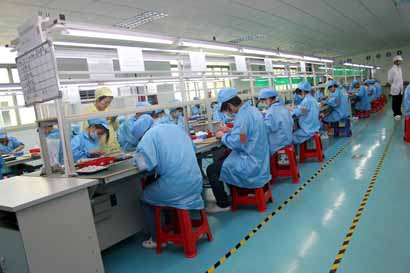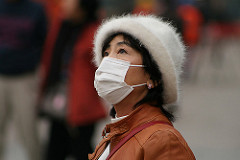The future of China’s underdeveloped vapor market hinges on regulation, innovation and consumer education.
By Stefanie Rossel
Despite its status as the birthplace of the modern e-cigarette and the largest producer of related hardware, China’s domestic vapor market remains tiny. In 2015, e-cigarettes generated sales of only $448 million, according to Jackie Zhuang, a Chinese vapor industry consultant. By comparison, the country’s eight leading cigarette brands alone accounted for $125 billion, according to Research and Markets.
Approximately 90 percent of the world’s vaping equipment, as well as accessories and a major part of e-liquids, are manufactured in China, but almost all of it is destined for export. Domestic product awareness remains low; even in major cities such as Beijing and Shanghai, vaping is uncommon.
Until 2013, there was virtually no domestic market for vapor products, explains Zhuang. “In 2013, the Chinese sales volume for e-cigarettes surpassed $14 million for the first time, and it was all through online sales.” Since then, however, the sector has shown impressive growth, with online sales climbing to $81 million in 2014 and $266 million in 2016.

Over the next five to 10 years, analysts expect that the market compound growth rate will exceed 30 percent. Due to China’s sheer size, the market for vapor devices holds enormous potential. A study on e-cigarette regulation in China, published in December 2016, calculates that for every 1 percent rate substitution of e-cigarettes for combustible cigarettes, the Chinese e-cigarette market will increase by almost $5 billion.
Zhuang estimates that there are currently between 1 million and 1.5 million Chinese vapers, most of them men. Only 2.4 percent of Chinese adult females are smokers, and an unknown percentage of females vape. “Half of the online buyers are interested in box mods, the other half in cigalikes. Among offline retail buyers, 99 percent purchase box mods and mechanical mods.”
Across all distribution channels, nominal e-cigarette sales in China totaled $448 million in 2016, according to Zhuang. Online sales accounted for 57 percent of that figure. “Most of the vape products in China are sold via Taobao/Tmall and jd.com, with Taobao officially accounting for a gross merchandise volume of $231 million,” says Zhuang. “However, it is common knowledge that a major percentage of this volume is generated by faking sales records.”
Retail outlets accounted for 37 percent of sales in 2016. “The number of shops had doubled comparing to 2015, but I estimate that at least 10 percent of the shops went out of business in January 2017 before Chinese New Year, after some investigations by several third-tier smaller cities in China, but surely also more new shops opened during that period,” says Zhuang.
The other traditional retail outlets contributed $29 million. “These channels include tobacco shops, gas stations, pharmacies, convenience stores and the other sales channels, such as corporate gift set packages,” says Zhuang. “All attempts of entries into the convenient store channel in China have failed, as cigalikes did not move in China.”
Apart from e-cigarettes, almost no other cigarette alternatives are consumed in China. “The sale of nicotine-replacement therapy products is negligible, accounting for less than $1 million per year,” says Zhuang. “Snus and other smokeless products do not exist. There are herbal cigarettes, but it’s a very small market.”
Attempts at tobacco control
The future of vapor in China will depend on consumer education and regulation, according to Zhuang.
In 2015, the Chinese government began to strengthen tobacco control measures. Its efforts included a tax increase on wholesale cigarettes from 5 to 11 percent in early 2015. In December 2016, China unveiled draft legislation to ban smoking in public places nationwide by the end of 2017. Zhuang says the ban has already been enacted in Beijing, Shanghai and Shenzhen. “The law enforcement in the first-tier cities is actually unexpectedly good,” he says.

Nationwide, however, attempts to ban smoking have mostly failed due to a lack of enforcement as well as China’s tobacco culture. Smoking is deeply rooted in Chinese society, particularly among older people. About 68 percent of men and 3.2 percent of women are smokers, according to China Briefing, a business intelligence company. For men, the pressure to smoke is high. In social and business settings, cigarettes are used to establish trust and form relationships. “With the rapidly changing demographics in China, young people are more aware of the negative health consequences of smoking and are either not smoking or looking for safer alternatives,” notes Brad Abrams, president of Vogue Trading International, who until recently worked for a China-based investment holding company.
Also frustrating smoking restriction efforts is the fact that China’s tobacco industry is state-owned. The China National Tobacco Corp. (CNTC) owns about 900 cigarette brands; tobacco generates an estimated 7 to 10 percent of China’s government revenue.
“Unlike in the West, where there is a natural tension between the government, who regulates, and the industry, which makes shareholder profits, in China the government and the industry are the same entity,” reflects Abrams. “The senior managers of [the State Tobacco Monopoly Administration]/CNTC are also high-ranking party members, a dual role. Taken together, in China there is a very strong motivation to protect the status quo in the tobacco economy. This includes fiscal income to the government, personal and institutional power of the top officials, and full employment in the countryside.”
As Chinese cigarette sales volumes have flattened, the industry has been adjusting its prices and product mix to protect revenues.
“Personally, I believe that e-cigarettes and vaping in China suffer from the same general lack of satisfaction compared to traditional cigarettes to most smokers in the West,” says Abrams. “That, coupled with the strong smoking culture and tradition in China, leads to a general lack of strong interest.”

Turning up the heat
Contrary to state-run combustible cigarette industry, the Chinese vapor sector is dominated by privately held manufacturers. The potential of next-generation products in China, however, has not been ignored by the monopoly. In 2015, it created the Shanghai Research Institute of New Types of Tobacco Products to help develop the new product category.
According to Euromonitor International, the State Tobacco Monopoly Administration (STMA) started researching and developing an e-cigarette product in 2013. One year later, CNTC’s provincial subsidiary in Hubei brought its first vapor products to market in Wuhan.
Blue & White and Ruisheng, two companies with ties to China’s tobacco industry, launched cigalikes, according to Zhuang. But all CNTC attempts to launch e-cigarettes have since stopped. “There is not any commercialization yet from China Tobacco,” he says. Zhuang believes that heat-not-burn products are a better fit for the Chinese tobacco monopoly than are e-cigarettes. “E-cigarettes will exist but they don’t bring value to the CNTC as far as tax intake is concerned,” he explains.
Abrams agrees. “The CNTC companies are well-aware of all of the nicotine alternatives available around the world,” he says. “I have made presentations to CNTC R&D groups describing the noncigarette alternatives, as well as new nicotine-delivery devices—as have many other westeners. Personally, I believe that the new technologies coming out of Philip Morris International [PMI] and to some extent British American Tobacco [BAT] are more interesting to the CNTC companies, as they may provide smokers with a more traditional nicotine-delivery experience, plus hold the potential to be taxed at a rate equivalent to or higher than current products—thus protecting their present revenues and power.”
Whatever the outcome of the STMA’s efforts, it will be interesting to see the implications for unaffiliated e-cigarette companies. Several international tobacco companies have shown interest in China’s e-cigarette market. In January 2017, Imperial Brands announced the establishment of a joint venture with the CNTC. Unlike joint ventures established by competitors, Hong Kong-based Global Horizon Ventures does not focus exclusively on conventional tobacco products. The partners are considering next-generation product launches “in due course.” Analysts speculate this could include Imperial’s Blu e-cigarette, which holds strong positions in both the U.S. and the U.K.
Abrams is less optimistic. “The tobacco industry in China is extremely complex, even more than in the West, with many factors influencing any potential change,” he says. “To date, STMA/CNTC has been focused on maintaining the status quo. It is a particularly difficult market to penetrate or change. As an example, look at the PMI/CNTC and BAT/CNTC joint ventures that have been in existence for many years with current relatively low market shares. Granted there are many other strategic benefits they have enjoyed, but STMA/CNTC continue to closely control their domestic market.”
Uncertain future
The future of next-generation products in China depends on several factors. The participation of the CNTC is critical, as is regulation of e-cigarettes. As of May 2016, no government agency in China had taken responsibility for regulating e-cigarettes. In the absence of regulations that treat e-cigarettes as either medical devices, pharmaceutical products or tobacco products, they are considered consumer products.
Other issues that will affect the future of the Chinese vapor sector include the price difference between combustible cigarettes and e-cigarettes, which is still significant, as well as the lack of quality control standards. Taxation will also play a role. Zhuang expects this process to take another three to five years. Product innovation will be key, according to Zhuang. “There is no perfect item for the Chinese market yet,” he says. “Chinese consumers are waiting for better vape products and better vape education.”











